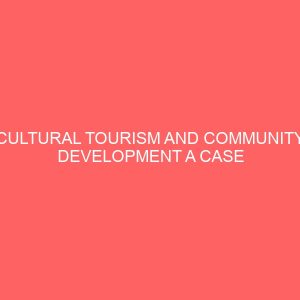Description
INTRODUCTION
For the past three years, international tourism has been booming. According to the World Tourism Organization WTO, 2009, International tourist arrivals reached 922 million in 2008, up 18 million over 2007, representing a growth of 2. International tourism receipts rose by 1.7 in real terms to US 944 billion 642 billion euros. Following four years of consecutive strong growth, an abrupt shift in trend occurred in the middle of the year, with tourism demand falling significantly under the influence of an extremely volatile world economy financial crisis, commodity and oil price rises and sharp exchange rate fluctuations, the evolution of the influenza A H1N1 outbreak, and above all the fair of terrorism.
International tourist arrivals have continued to grow from 25 million in 1950, to 277 million in 1980, to 438 million in 1990, to 684 million in 2000, and reaching 922 million in 2008 WTO, 2009.
Africa has been one of the strongest growth markets, with most destinations showing consistently above average increases in arrivals and receipts. Between 2000 and 2005, international tourist arrivals to Africa increased from 28 million to 40 million an average growth of 5.6 a year, compared to a worldwide 3.1 a year. In the same period Africas International tourism receipts doubled from US 10.5 billion to US
THE STATE OF TOURISM IN NIGERIA
While tourism industry in Nigeria has never been fully developed in a large scale capacity, it has suffered a great deal during the past military and civilian rule. According to Gray, 1989, p.121, Nigeria is still not a popular tourist destination. Unlike Kenya, with its vast game preserves, or the Ivory Coast, services in Nigeria are not geared in as large degree to tourists. Many countries have invested heavily in tourism and have acquired a high level of economic dependence on inbound tourism, but the opposite is true in case of Nigeria. Tourism, although beginning to perform well in other African countries such as Ghana, South Africa, Kenya, and even Tanzania; is almost nonexistent in Nigeria. Owing to the countrys poor international image, combined with the obstacles placed in the way of visitors, for example difficulties in obtaining visas and the lack of suitable accommodation, few people visit Nigeria solely as tourists.
In late 2002, the government declared tourism as one of its six key areas for economic development in 200307. It is therefore, the intention of this study to see how tourism could be well developed and promoted in other to attract tourists to the country. Tourism as an industry has been considered to be a vital part of the world economy. Everyday people move from one location to the other. Tourism is therefore, considered as the worlds largest industry. There has been steady increase of tourist throughout the world. Despite the depressed nature of international economy, over US464 billion excluding international airfare payments were generated in the international tourist receipts in 2001 Dieke, 2003.
However, Africa recorded only 2.5 of the market; out of which, Nigeria received only 3. Not much work has been done extensively in the area of marketing tourism in Nigeria; therefore, few literatures are available for review; however, extensive body of literature in the field of tourism is incorporated, especially in the area of tourism information. Many destinations with a variety of attractions have failed to attain their tourism potentials because their promotion is not themed or effectively targeted.
Promotion is particularly invaluable in tourism because of its intangible and immobile nature and, quite importantly, tourism is an experience that cannot be inspected or tested before purchase. Thus, unlike manufacturing, which distributes products to market, tourism moves market to products Fakeye, 1991.
These peculiarities in tourism pose challenges that require articulated promotional strategies, planning and management practices Awaritefe, 2003.
With an estimated 2.6 million international tourists arrival in 1999, West Africa accounted for just 10 of the regional total. Six countries out of the 14 in the sub-region recorded more than 100,000 international tourists in 1999. Nigeria attracted the major share with close on 770,000 arrivals it captured a sub-regional market share of 30. Of all international arrivals in West Africa, 45 originate from within the region itself, followed by the Americas with 5, and East Asia, Southeast Asia, and the Pacific together with 4.7 Nevin, 2003. In order to increase her share of the market for tourism, Nigeria must consideration in planning and managing tourism destinations and enterprises in the era of globalization Wahab Cooper, 2001, p. 69. Tourism is still being developed in Nigeria; as a result, there is a new federal policy in preparation which recognizes the vast potential of the subsector. With the governments renewed interest and new private sector initiative, there are indications that there are more exciting days ahead for every tourist Craig, Olumhense, Oyo, Tanoloju, Utomi, 1990.
According to UNWTO 2010, the longhaul travel worldwide will grow faster, at 5.4 per cent over the period 19952020, than the interregional travel, at 3.8 per cent. Consequently, the ratio between interregional and longhaul travel will shift from around 82:18 in 1995 to close to 76:24 in 2020.
Tourism is not a clearcut sector but an allembracing and pervasive domain of service and industrial activities. It touches upon almost all spheres of national life within the country and that is particularly the reason why a sound state policy of tourism should be essentially formulated before any significant tourism investment projects are launched Wahab Cooper, 2001, p. 5. As rightly put by MacCannell, tourism is an ideological framing of history, nature and tradition; a framing that has the power to reshape culture and nature to its own needs MacCannell, 1992. Some writings already maintain that globalization, as a mega trend, is changing the nature of international tourism Keller, 1996.
Tourism has become a landmark in human activities reaching 800 million international tourist visits in 2005 and registering receipts totaling 444 billion without the cost of international transport which may reach US180 billion. The continued expansion of tourism in the world due to world population growth, increasing affluence of many nations, the expansion and diversification of travel motivations and expectations, great technological achievements in information and communication, the fierce competition between an increasing number of tourist destinations, and deregulation movements, is an important playground for global forces. The new technologically advanced distribution channels permit anyone to receive the most uptodate multimedia information on the best connections, and at the best prices, for most attractive destinations in the world Keller, 1996.
Populations of various countries respond to this globalization of economies, markets, systems and cultures by looking at their own identities, as in contrast to globalization lies localization which is an opposing force. These two adverse forces cannot be averted by the state, the market or communities by acting alone Cleverdon, 1998. Moreover, increased awareness of physical and cultural heritage safeguards have induced various tourist destinations to engage in the complex planning process for sustainable development in tourism. In addition, the Free Trade in Services Agreement is another difficult tunnel for globalization to go through Wahab and Pigram, 1997. Cultural differences between individual tourist destinations will continue to play an important role, among other factors, in the choice of a holiday destination. However, a transcending global cultural understanding might eventually emerge cutting across various cultural diversities with each having its local flavor.
The marketability of individual destinations and global tourism is vulnerable to sudden changes in market perceptions. Acts of man or nature can transform the reputation, desirability and marketability of the most popular tourism destinations overnight Beirman, 2003, p. 3. The attacks of September 11, 2001, in which hijacked Boeing 767 and 757 commercial aircraft were used as flying missiles which blew up the Twin Tower of the World Trade Center in New York City and part of the Pentagon in Washington DC, massively disrupted global tourism. This 2001 attacks generated panic, thereby, compromising the security of commercial aircraft and global tourism safety worldwide.








Reviews
There are no reviews yet.